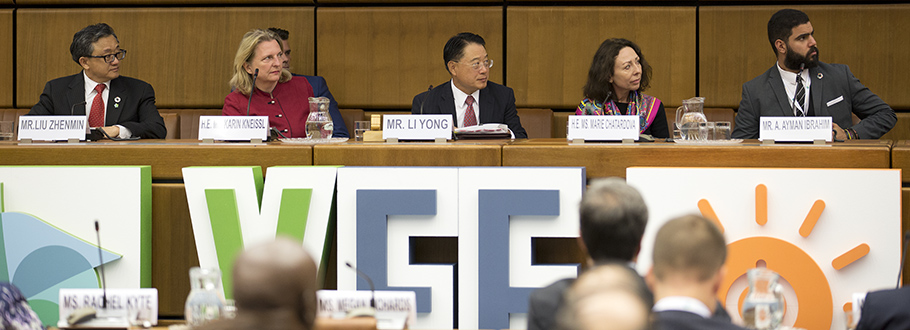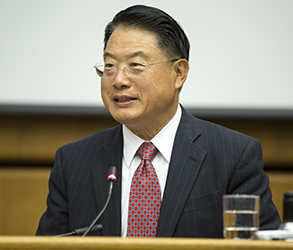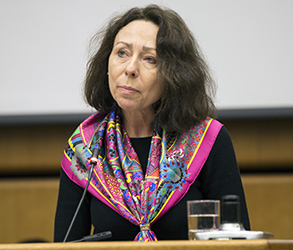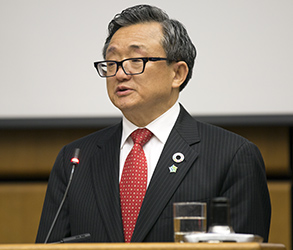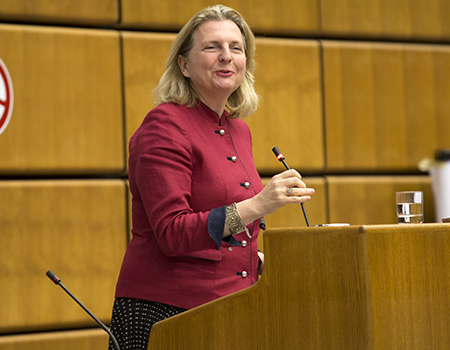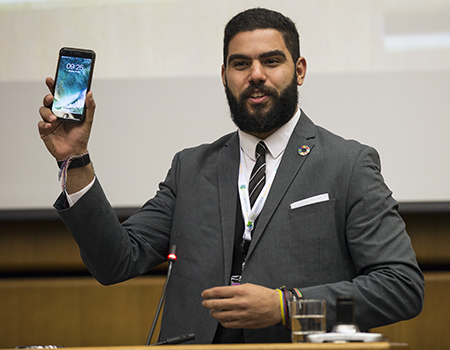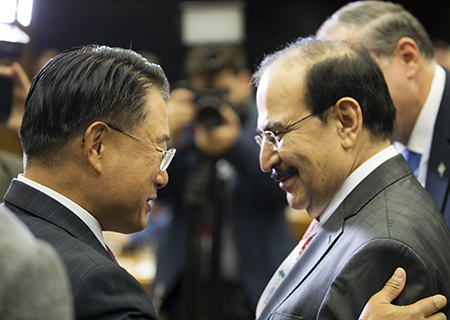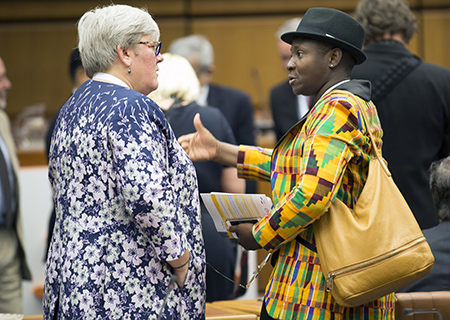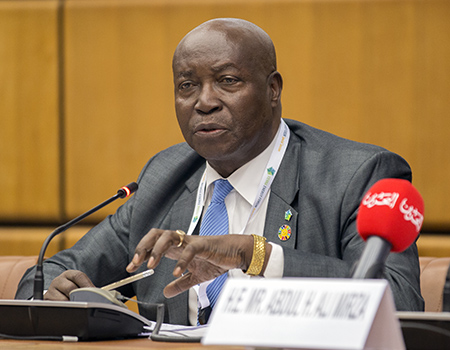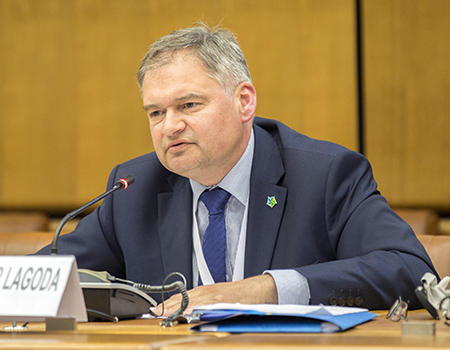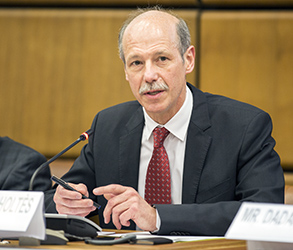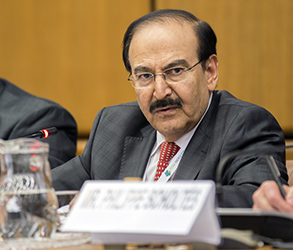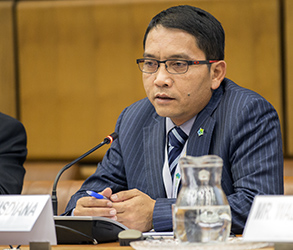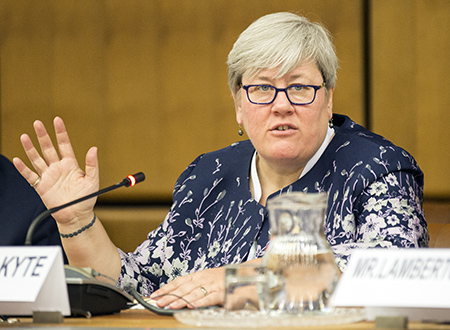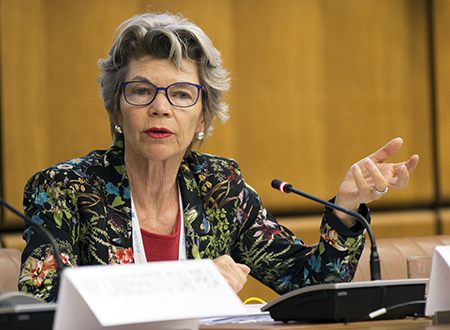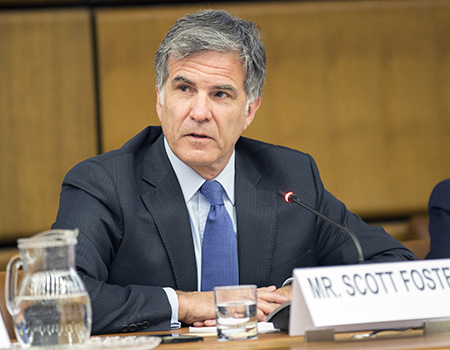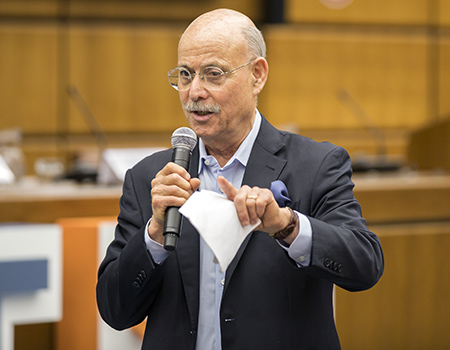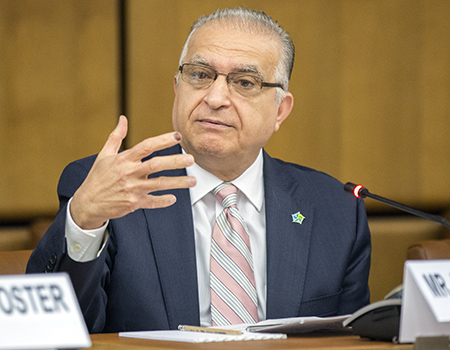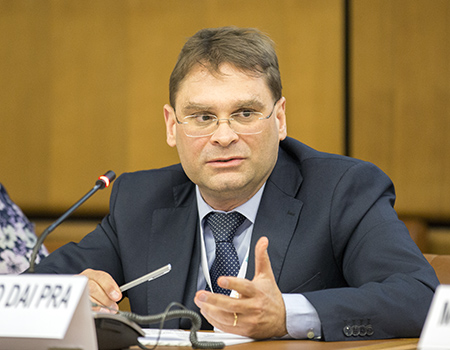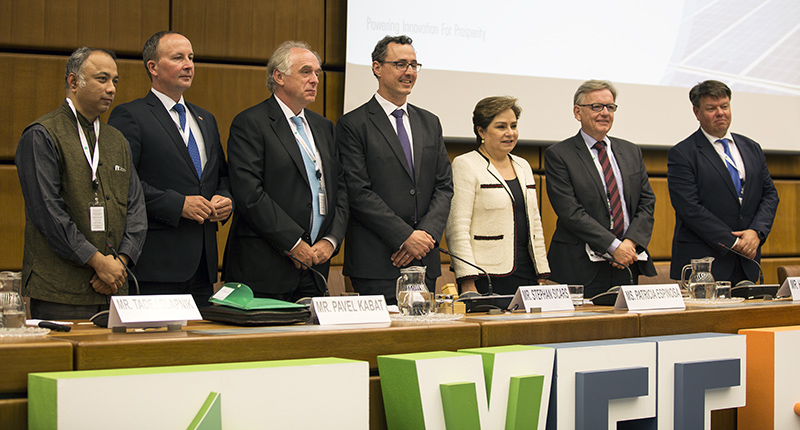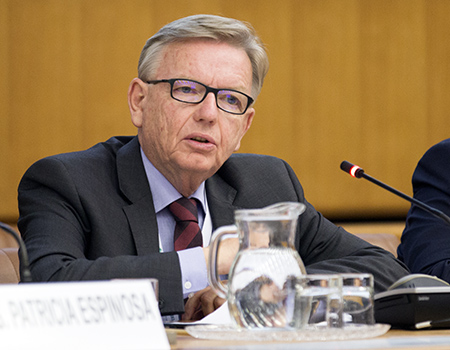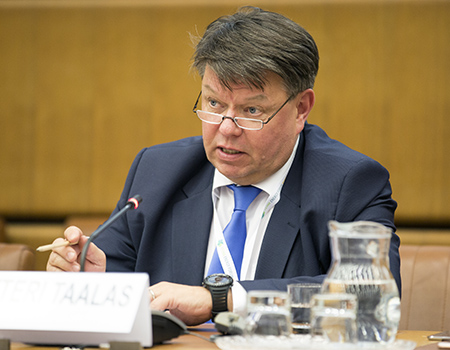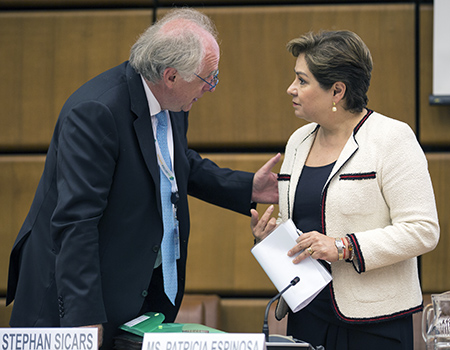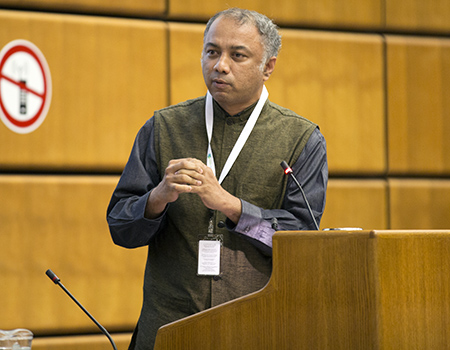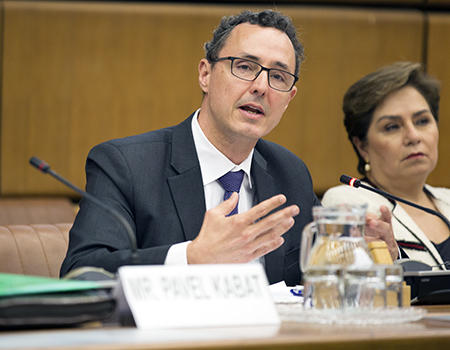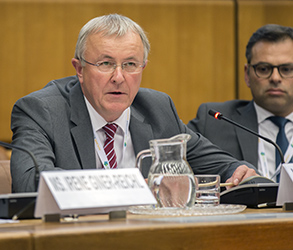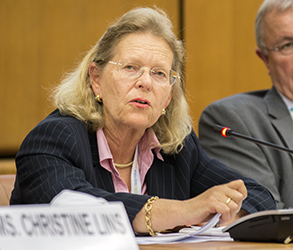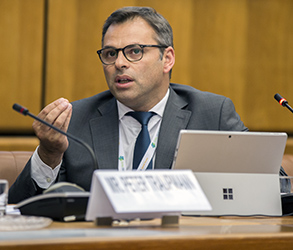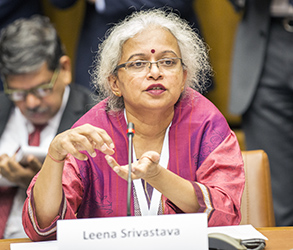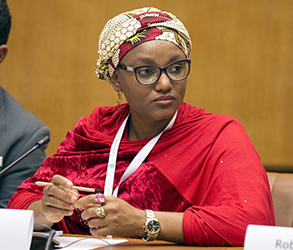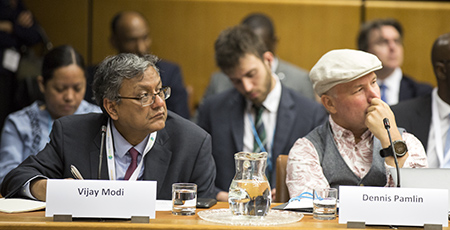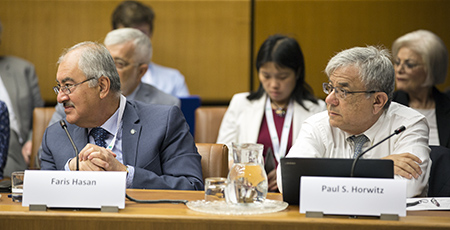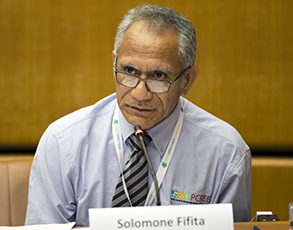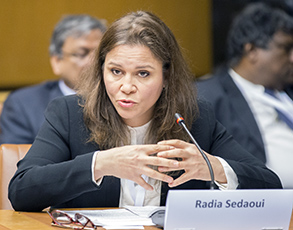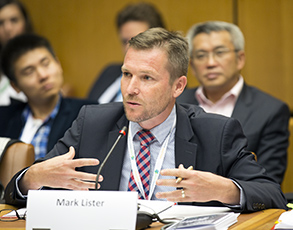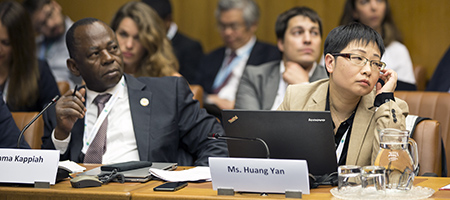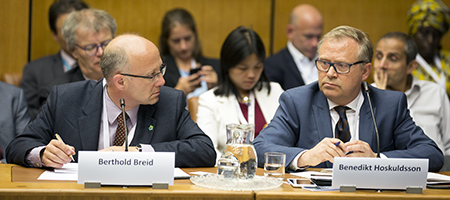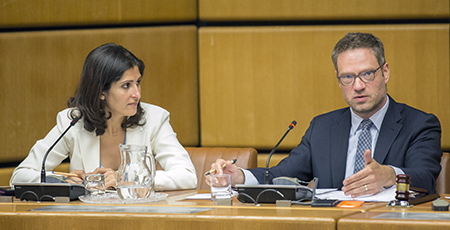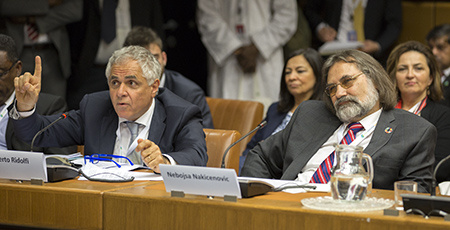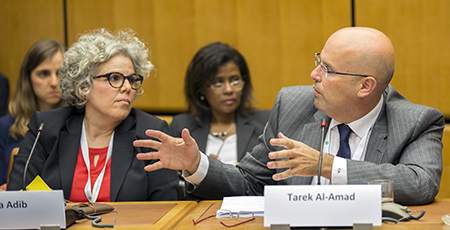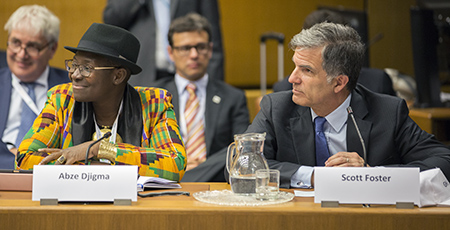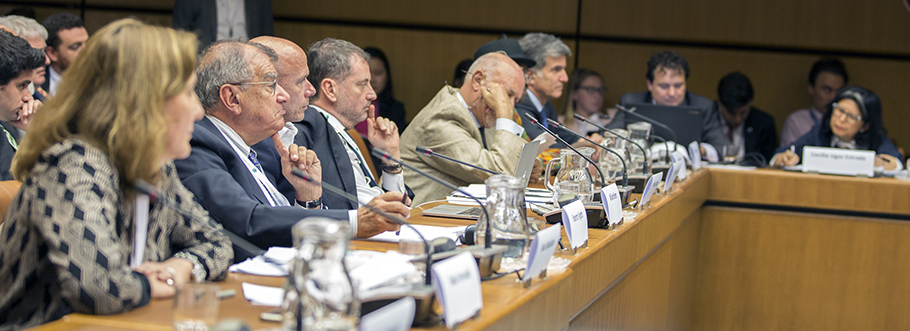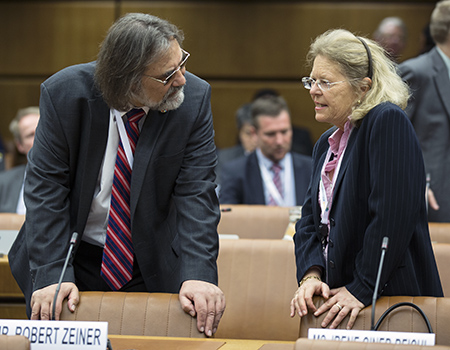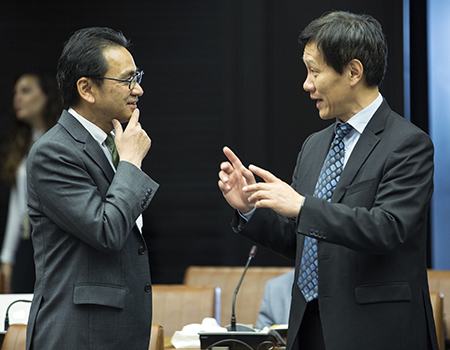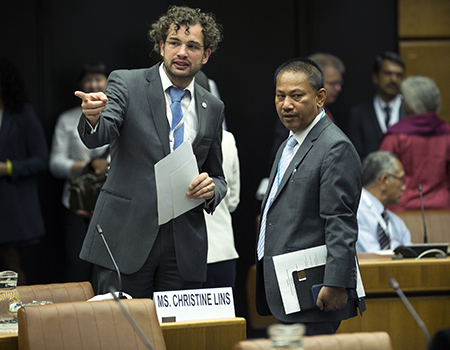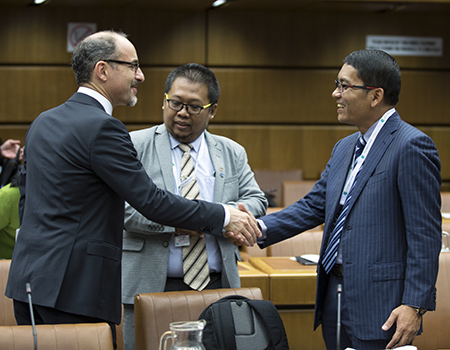Summary
The Special Session of the 2018 Vienna Energy Forum convened on Monday, 14 May, in plenary session and high-level roundtables with the participation of over 430 attendees. The Special Session breaks the bi-annual cycle of the Forum in order to provide feedback on SDG 7 (energy) to the High-Level Political Forum on Sustainable Development (HLPF).
During the morning plenary, focusing on the transformation of energy systems, participants heard Jeremy Rifikin, Foundation on Economic Trends, describing the energy transition as humanity’s third economic revolution, which he said was founded on the convergence of decarbonization, decentralization and digitization of transport. Panelists discussed challenges and opportunities in several regions, including energy access, energy efficiency, the EU clean energy package, and private sector considerations.
In the first afternoon plenary, panelists addressed climate change and clean energy technology innovation, as well as how to empower and catalyze entrepreneurial eco-systems for climate innovation in developing countries. In the second plenary, focused on the role of partnerships in achieving development, panelists addressed, among others, interlinkages between different Sustainable Development Goals (SDGs), regional initiatives and centers of excellence in the energy sector, and the role of donors.
The morning high-level roundtable focused on enhancing the participation of small and medium enterprises (SMEs) and start-ups from developing countries in climate and clean energy technology and innovation markets. Participants discussed, among others, policy support needed to nurture SMEs, how to move from project-based to integrated approaches, how large companies can provide support for SMEs, and barriers for clean energy development.
In the afternoon, a roundtable heard from the clean energy centers of the Global Network of Regional Sustainable Energy Centres (GN-SEC) and other regional initiatives on the role of regional approaches to scaling up clean energy. The last roundtable addressed socio-economic impacts of low-carbon energy systems, finance, and the potential for clean energy to catalyze industrial transformation in developing countries.
In the high-level segment on powering innovation for prosperity, panelists reflected on national experiences, the effectiveness of policy instruments, and how the international community can help accelerate energy transitions. During the closing session participants heard about preparations for the SDG 7 review during the HLPF.
IISD Reporting Services, through its ENB+ Meeting Coverage, has provided digital coverage and a summary report from VEF 2018. The summary report is now available in HTML and PDF.
Photos by IISD/ENB | Mike Muzurakis
For photo reprint permissions, please follow instructions at our Attribution Regulations for Meeting Photo Usage Page
Opening Session
From L-R: Liu Zhenmin, Under-Secretary-General, UN Department of Economic and Social Affairs (UN DESA); Karin Kneissl, Federal Minister for Europe, Integration and Foreign Affairs, Austria; Li Yong, Director-General, UN Industrial Development Organization (UNIDO); Marie Chatardová, President, UN Economic and Social Council (ECOSOC); and Abdelrahman Ayman Ibrahim, Global President, International Association of Students in Economic and Commercial Sciences (AIESEC)
Li Yong, Director-General, UNIDO
Marie Chatardová, President, ECOSOC
Liu Zhenmin, Under-Secretary-General, UN DESA
Karin Kneissl, Federal Minister for Europe, Integration and Foreign Affairs, Austria
Abdelrahman Ayman Ibrahim, Global President, AIESEC
Li Yong, Director-General, UNIDO, with Abdul Hussain Ali Mirza, Minister of Electricity and Water Affairs, Bahrain
Rachel Kyte, CEO and Special Representative of the UN Secretary-General for Sustainable Energy for All, with Abze Djigma, CEO, AbzeSolar
High-level Segment: Powering Innovation for Prosperity
Simon D’Ujanga, Minister of State for Energy and Mineral Development, Uganda
Waldemar Łagoda, Deputy Director of the Department of Energy, Ministry of Energy, Poland
Philippe Scholtès, Managing Director, Programme Development and Technical Cooperation, UNIDO
Abdul Hussain Ali Mirza, Minister of Electricity and Water Affairs, Bahrain
Dadan Kusdiana, Advisor to the Minister of Energy and Mineral Resources, Indonesia
Plenary 1: Energy System Transformation: Opportunities and Challenges for Developing and Emerging Economies
From L-R: Jeremy Rifkin, President, Foundation on Economic Trends; Scott Foster, Director, Sustainable Energy Division, UN Economic Commission for Europe (UNECE); Mohamed Ali Alhakim, Under-Secretary-General and Executive Secretary, UN Economic and Social Commission for Western Asia (ESCWA); Edu Willemse, Public Relations and Partnerships Manager, Energising Development (EnDev) program, GIZ; Rachel Kyte, CEO and Special Representative of the UN Secretary-General for Sustainable Energy for All; Lamberto Dai Pra, Head of Sub-Saharan Africa, Asia and Australia, Enel Green Power; and Megan Richards, Director of Energy Policy, Directorate-General for Energy, European Commission
Rachel Kyte, CEO and Special Representative of the UN Secretary-General for Sustainable Energy for All
Megan Richards, Director of Energy Policy, Directorate-General for Energy, European Commission
Scott Foster, Director, Sustainable Energy Division, UNECE
Jeremy Rifkin, President, Foundation on Economic Trends
Mohamed Ali Alhakim, Under-Secretary-General and Executive Secretary, ESCWA
Lamberto Dai Pra, Head of Sub-Saharan Africa, Asia and Australia, Enel Green Power
Plenary 2: Climate and Clean Energy Technology and Innovation: Empowering and Catalyzing Entrepreneurial Eco-systems for Climate Innovation in Developing Countries
From L-R: Harish Hande, Chairman, SELCO India; Tadej Slapnik, State Secretary, Cabinet Office of the Prime Minister, Republic of Slovenia; Pavel Kabat, Director-General and CEO, International Institute for Applied Systems Analysis (IIASA); Stephan Sicars, Director, Department of Environment, UNIDO; Patricia Espinosa, Executive Secretary, UN Framework Convention on Climate Change (UNFCCC); Howard Bamsey, Executive Director, Green Climate Fund (GCF); and Petteri Taalas, Secretary-General, World Meteorological Organization (WMO)
Howard Bamsey, Executive Director, GCF
Petteri Taalas, Secretary-General, WMO
Pavel Kabat, Director-General and CEO, IIASA, and Patricia Espinosa, Executive Secretary, UNFCCC
Harish Hande, Chairman, SELCO India
Tadej Slapnik, State Secretary, Cabinet Office of the Prime Minister, Republic of Slovenia
Stephan Sicars, Director, Department of Environment, UNIDO
Plenary 3: Delivering Prosperity through Partnerships: North-South and South-South Technology Cooperation
From L-R: Dirk Fransaer, Managing Director, Flemish Institute for Technological Research; André Faaij, Professor, University of Groningen; Robert Zeiner, Director of International Programmes and Projects, Austrian Development Agency; and Christine Lins, Co-Founder, Global Women’s Network for the Energy Transition
Peter Traupmann, Managing Director, Austrian Energy Agency
Irene Giner-Reichl, President, Global Forum on Sustainable Energy
Alexandre Pinho, Global Lead for the UN, Microsoft
Round Table 1: Enhancing the Participation of SMEs and Start-ups from Developing Countries in the Growing Markets for Climate and Clean Energy Technology and Innovation
Nisha Pillai, International moderator and Journalist
Leena Srivastava, Vice-Chancellor and Professor, TERI University
Habiba Ali, Managing Director and CEO, Sosai Renewable Energies Company
Vijay Modi, The Earth Institute, Columbia University, and Dennis Pamlin, Senior Advisor, Research Institute Sweden
Faris Hasan, Director, OPEC Fund for International Development, and Paul S. Horwitz, Strategic Planning Consultant, Green Climate Fund
Round Table 2: A “New Deal” for Economies of Scale and Inclusiveness - The Global Network of Regional Sustainable Energy Centres (GN-SEC)
From L-R: Christine Lins, Co-Founder, Global Women’s Network for the Energy Transition; Robert Zeiner, Director, Programmes and Projects International, Austrian Development Agency; Albert Binger, Secretary-General, Small Island Developing States Sustainable Energy and Climate Resilience International Organization; Tareq Emtairah, Director, Department of Energy, UNIDO; and Igor Barat, Director, European Regional Office, International Investment Bank
Solomone Fifita, Manager, Pacific Centre for Renewable Energy and Energy Efficiency
Radia Sedaoui, Chief Energy, UN Economic and Social Commission for Western Asia
Mark Lister, Head, Copenhagen Centre on Energy Efficiency
Mahama Kappiah, Executive Director, ECOWAS Centre for Renewable Energy and Energy Efficiency, and Yan Huang, Deputy Chief Engineer, Chang Jiang Survey Planning Design Research Co., Ltd.
Berthold Breid, CEO, The Renewables Academy, and Benedikt Hoskuldsson, Partnerships Lead, Sustainable Energy for All
Round Table 3: Emerging Low-carbon Energy Systems as a Catalyst for Industrial Transformation in Developing Countries
From L-R: Miquel Muñoz Cabré, IISD; Cecilia, Ugaz Estrada, Director, Department of Policy Research and Statistics, UNIDO; Edu Willemse, Public Relations and Partnerships Manager, EnDev program, GIZ; Carsten Hellpap, Programme Manager, Energising Development Partnership, German Corporation for International Cooperation; and Tareq Emtairah, Director, Department of Energy, UNIDO
Rana Ghoneim and Mark Draeck, Energy and Climate Change Branch, UNIDO
Roberto Ridolfi, Special Advisor on Strategy and Financing Development, Food and Agriculture Organization, and Nebojsa Nakicenovic, Deputy Director-General and Deputy CEO, IIASA
Rana Adib, Executive Secretary, Renewable Energy Policy Network for the 21st Century, and Tarek Al-Amad, CEO, European Jordanian Renewable Energy Projects
Abze Djigma, CEO, AbzeSolar, and Scott Foster, Director, Sustainable Energy Division, UNECE
Closing Session
Tareq Emtairah, Director, Department of Energy, UNIDO
Minoru Takada, Team Leader (Sustainable Energy), Division for Sustainable Development Goals, UN DESA
